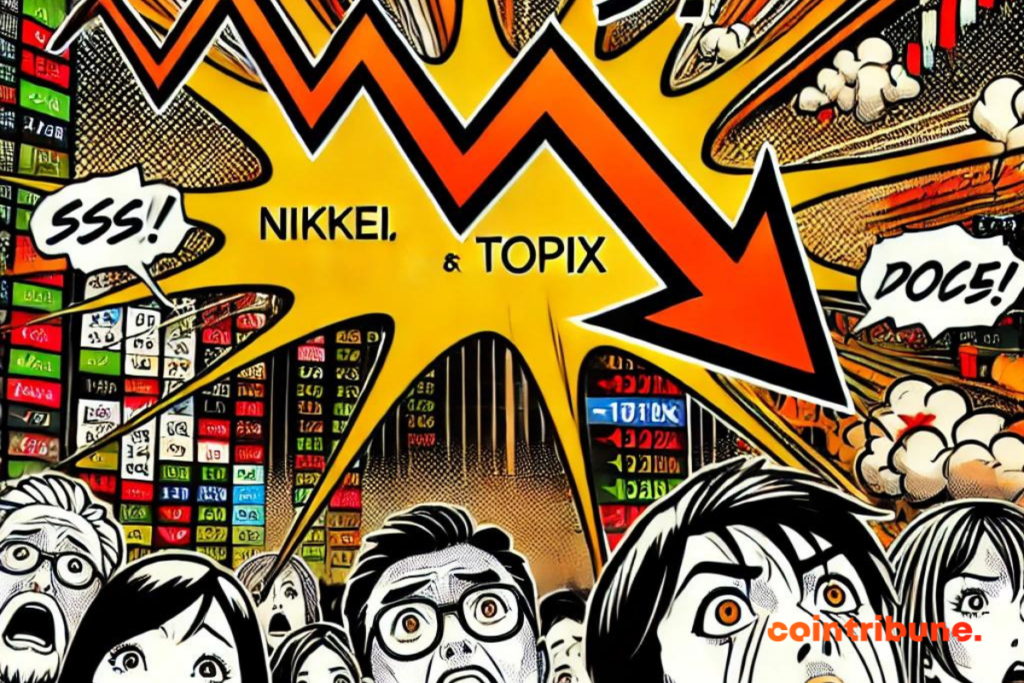Asian Stock Markets Plunge After Wall Street Crash!
On August 5, a historic financial debacle occurred in Asia. Following the Wall Street earthquake, Asian stock markets followed suit, plunging into an abyss of losses. The Nikkei, the benchmark index of the Tokyo Stock Exchange, fell by 12.4%, closing at 31,458.42 points. This dizzying plunge comes after an already significant drop of 5.8% the previous Friday, marking one of the darkest weeks for Asian financial markets.

A wave of global panic
A wave of global panic swept through Asian markets, fueled by complex economic and political factors.
The immediate trigger? A U.S. jobs report that fell short of expectations, sending shockwaves through global markets.
Panic-stricken investors abandoned risky assets, causing a free fall in stocks and bonds. It wasn’t just Wall Street that wavered. In fact, this turbulence was felt across the Pacific, where Asian markets collapsed in turn.
In the background, heightened geopolitical tensions in the Middle East, with threats from Iran and its allies against Israel, added another layer of uncertainty.
These events heightened investor nervousness, creating an explosive cocktail of volatility. In this turbulent context, market resilience was put to the test, with disastrous results for Asian indices.
The shock of Japanese monetary policy
Amidst this global chaos, a surprise decision by the Bank of Japan further nailed the coffin for the markets.
The announcement of an unexpected rate hike caught investors off guard. After years of negative rates, this monetary about-face was seen as a wake-up call.
The reaction was immediate: the yen soared. This makes Japanese products more expensive for export, heavily impacting exporting companies.
Dilin Wu, a strategist at Pepperstone, described this rate hike as a “thunderbolt” for Japanese markets.
This decision not only contributed to the fall of the Nikkei but also revived concerns about Japan’s future economic growth. With a stronger yen, profit margins for exporting companies are under pressure, intensifying economic uncertainty.
Banking and tech giants in trouble
Japanese banks, once perceived as solid pillars, are particularly undergoing this turmoil.
Shares of Mitsubishi UFJ Financial Group, Sumitomo Mitsui Financial Group (SMFG), and Mizuho plunged by 13.5%, 14.6%, and 12.8% respectively.
This debacle reflects the financial institutions’ vulnerability to monetary and economic shocks. Additionally, concerns about future profits, exacerbated by a rising yen, have intensified the pressure on these banking giants.
The tech sector hasn’t escaped the crisis either. Nintendo, the video game giant, saw its share price drop by 11.2%.
The company reported a drop in first-quarter net profit and issued cautious forecasts. These forecasts are attributed to an uncertain market and a short-term lack of new flagship products. This pervasive pessimism underscores the fragility of tech companies in the face of global economic fluctuations.
The plunge of Asian stock markets, following in the footsteps of Wall Street, highlights the complexity and interconnectedness of global markets. The coming developments, both economically and geopolitically, will be crucial in determining the way forward. Meanwhile, the crypto market plunges.
Maximize your Cointribune experience with our "Read to Earn" program! For every article you read, earn points and access exclusive rewards. Sign up now and start earning benefits.

Fascinated by Bitcoin since 2017, Evariste has continuously researched the subject. While his initial interest was in trading, he now actively seeks to understand all advances centered on cryptocurrencies. As an editor, he strives to consistently deliver high-quality work that reflects the state of the sector as a whole.
The views, thoughts, and opinions expressed in this article belong solely to the author, and should not be taken as investment advice. Do your own research before taking any investment decisions.